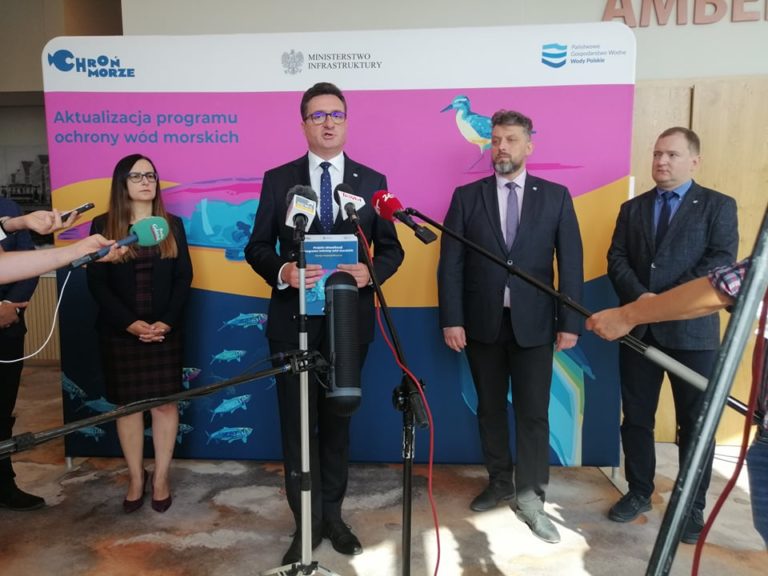




On July 9 in Gdańsk, during the “Protect the Sea” conference, public consultations on the marine water protection program (aPOWM), organized by the Ministry of Infrastructure and PGW Polish Waters, began.
During the meeting attended by Przemysław Daca, President of PGW Waters, nearly 60 actions to improve the condition of the Baltic Sea were discussed. The program is one of the most important programs aimed at rationalizing water management in Poland.

The protection of the Baltic Sea is in our hands
Halting the degradation of the Baltic Sea and its active protection depends primarily on what is happening on land. Poland has a special role to play in this respect – as much as 99.7% of our country lies in the Baltic basin, flows into it by the two largest rivers in the entire basin: the Vistula and the Oder. Additionally, we are one of the most populous countries in this area. Therefore, the scale of our actions must be correspondingly large.
Naturally, the proposed solutions will apply not only to the coastal area, but the entire country, primarily agriculture and water and sewage management in connection with the nitrogen and phosphorus compounds they generate, which end up in the waters. The proposed actions are ambitious but real. Inter-ministerial cooperation and the involvement of local government units is the foundation for updating the Sea Waters Protection Program. Let us remember that each of us can contribute to the improvement of the situation. A three-month public consultation that we start is the best way to understand the needs and build trust for the necessary activities outlined in the project. – said Minister Marek Gróbarczyk, secretary of state in the Ministry of Infrastructure, Government Plenipotentiary for water management and investments in maritime and water management.
Sea transport, fishing and tourism – these are just some of the sectors dependent on the Baltic Sea. Their maintenance and development will not be possible without proper protection. It depends to a large extent on the activities and investments undertaken mainly in the vicinity of Polish rivers flowing into the sea. APOWM has planned activities ranging from cleaning the beaches of rubbish and fighting underwater noise to systemic solutions to stop the eutrophication of the reservoir.
A sea without cyanobacteria
The Baltic Sea, at 53 m of medium depth and a relatively small area, is a reservoir of low salinity. Due to these features, the swimming pool is exposed to the constant “interference” of freshwater rich in nutrients from agriculture and municipal wastewater flowing into it. This causes regular algae blooms that activate the mechanism of the formation of anaerobic zones, which is destructive for the entire marine trophic (food) chain.

– The effects of the eutrophication of the Baltic Sea affect aquatic organisms, but also everyone resting on the Baltic Sea. The most famous and visible eutrophication effect is the mass blooms of cyanobacteria. This more and more frequent phenomenon in the Baltic Sea is the result of its survival. The goal of aPOWM is to stop this process. It is also one of the 11 parameters on which the maintenance or improvement of the good environmental status of marine waters depends. The activities planned in aPOWM will therefore mean, in particular, significant reductions of nutrients. Full implementation of the planned activities may result in a reduction of nitrogen loads by more than 60 thousand. tons and phosphorus by over 5 thousand. tonnes – said Przemysław Daca, President of the National Water Management Authority, Polish Waters, which is responsible for the development of aPOWM.
As many as 19 measures will directly contribute to the protection of the Baltic Sea – its biodiversity, including the protection of birds, marine mammals and the fight against invasive species. Underwater noise also affects marine ecosystems. That is why it is so important to implement a register of sources of impulse noise, to reduce underwater noise in Natura 2000 areas where marine mammals are the object of protection, and to develop and implement guidelines for the disposal of explosives lying on the bottom of the Baltic Sea.
Every second litter in the Baltic Sea comes from households
In view of the problem of cyanobacterial bloom and water pollution, it is extremely important to reduce the amount of waste flowing to the Baltic Sea through rivers, as much as 48% of it comes from households. This is one of the foundations of the project.
The planned reduction of nutrients in wastewater and measures for agricultural catchments are also intended to help reduce the inflow of these compounds to the Baltic Sea. The goal is not only clean beaches, but also rivers without rubbish, therefore the activities proposed in the project include cleaning the banks of rivers and beaches, developing a strategy to reduce the leakage of waste from sewage systems to waters, or equipping municipalities with beach cleaning equipment. A complete list of these activities is available in the document draft.
Save the sea – your vote is also important!
Until October 5, 2021, public consultations on the draft update of the marine water protection program are ongoing. It is an opportunity for each of us to influence the shape of activities for the protection of the waters of the Baltic Sea. During the consultations on the aPOWM project, a 21-day consultation on the environmental impact assessment of this document will be carried out.
Anyone can submit comments and applications to the draft document, e.g. through a specially prepared form on the website www.chronmorze.eu. We invite you to participate in aPOWM public consultation! Let’s protect our sea together!
